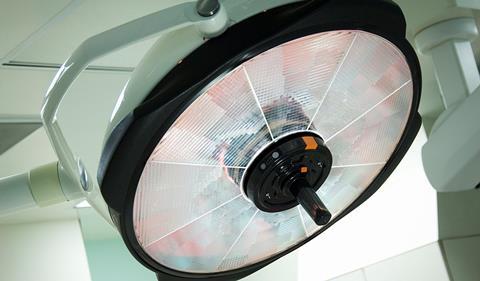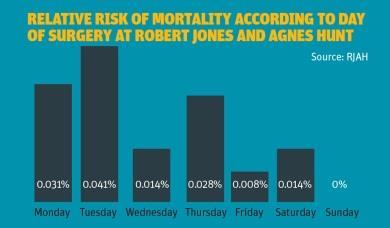A Shropshire trust is bucking the trend regarding the dangers of operating on patients at weekends by deliberately focusing on providing safer Friday to Sunday surgery, writes Stephen White

Very little elective surgery is carried out at weekends, leaving theatres empty
In the UK, very little elective surgery is carried out at weekends, leaving theatres empty. Why are patients not being treated at weekends in an age when consumers are used to access all manner of services irrespective of the day of the week?
‘There is no suggestion of a higher mortality when patients are operated on Friday or Saturday at this trust’
Recently, any enthusiasm for expanding the working week has been dampened by revelations about the dangers of operating at weekends.
At Robert Jones and Agnes Hunt Orthopaedic Hospital Foundation Trust over the past 10 years, there has been a deliberate focus on providing safer surgery at weekends.
Theatre efficiency
Improving the efficiency of the vacant theatres on Saturdays has increased income for the trust by up to 20 per cent when the number of extra cases carried out per week which would not have been possible during weekdays because the theatres were already at full capacity is taken into account. The shorter waiting times for surgery and more convenient day cases operating at weekends also satisfied patient expectations.
‘The risk of death was 44 per cent higher if the patient was operated on a Friday and 82 per cent higher if over the weekend’
Researchers at the Dr Foster Intelligence Unit at Imperial College London looked at more than 4 million elective procedures in 2008-11. They found that the risk of death was 44 per cent higher if the patient was operated on a Friday and 82 per cent higher if operated on over the weekend.
Surprisingly, this higher risk was noted despite the patients having better preoperative health and less complex surgical procedures carried out.
This effect has been noted in the US, too, with a higher 30-day mortality risk in patients undergoing non-emergency surgery on Friday rather than Monday to Wednesday.
Safer surgery focus
Since its focus on safer surgery at weekends, the hospital seems to be bucking the trend. It specialises in orthopaedic surgery and carries out about 10,000 procedures a year and in 2000-12 recorded 33 deaths after elective orthopaedic procedures.
It was able to identify exactly which day of the week the operation took place of those who died, and extrapolated from the complete 2012 data the frequency of operations according to the day of week for the entire period.
The graph below shows the proportion of patients who died according to the day of the week and demonstrates a low mortality risk on Friday and on Saturday; at 0.008 per cent for Friday and 0.014 per cent on Saturday, with an average mortality rate for the trust at 0.023 per cent.

It was also able to compare its standardised mortality ratio, which includes adjustments for comorbidities, with a peer group of seven specialist orthopaedic centres and this revealed the trust to have the second lowest mortality risk at 60 per cent.
Because the number of deaths is small, it is inappropriate to ascribe statistical significance to these results. However, there is no suggestion of a higher mortality when patients are operated on Friday or Saturday at this trust.
Facilities that make surgery safer
- A high dependency unit specifically ringfenced for orthopaedic elective surgery has been established and staffed throughout the week
- Robert Jones and Agnes Hunt established an early warning system (MEWS) for monitoring patients on all wards post-operatively to detect any early sign of deterioration in a patient’s status and take appropriate action
- There is a critical care outreach team which is able to visit the ward and help the ward nurses to assess and deliver any extra care that is required
- Surgeons work closely with their clerks avoid admitting patients with highly complex surgery or patients with complex comorbidities on Saturdays
- All patients admitted for surgery on Fridays and Saturdays have ringfenced elective orthopaedic beds with orthopaedic trained nurses to look after them
Changes to contracts
Weekend work began with surgeons carrying out waiting list initiatives to deal with the problem of access times for the NHS.
This was not sufficient to establish a regular pattern of weekend working and therefore consultants were invited to change their contracts and job plans to include Saturday working − such as one weekend in four − in exchange for a day off in the week. Not all surgeons were willing to do so, nor has there been “forced change”.
‘The shift to Saturday working has involved a big commitment from other groups of hospital staff’
New consultant appointments have Saturday working with a day off in lieu built into their job plans as described above unless there is a heavy on-call commitment.
The anaesthetists have been key in accepting a flexible working component to their contracts so that not only can regular NHS surgery be carried out, but peaks and troughs can be accommodated to deal with the fluctuating waiting lists and target times for treatment.
The shift to Saturday working has involved a big commitment from other groups of hospital staff, including theatre staff and pharmacists, and this involves recruiting more staff to provide existing staff with the reasonable work life balance; everyone needs some time for work, rest and play.
Popular with patients
The provision of Saturday surgery has been very popular with patients. The hospital scores at the highest level with the friends and family test (in the top 10 percentile).
There is also a reassuring presence of many consultants, surgeons and anaesthetists, visible throughout the hospital at the weekend so inpatients are not left from Friday to Monday with minimal consultant input.
All this contributes to the hospital being ranked at band 6 by the Care Quality Commission in 2013 for the highest standards of care to patients.
What can other trusts learn?
The British Medical Association and researchers who have pointed out the dangers of weekend operating have made an important contribution to the debate about standards in our hospitals.
However, there are great opportunities for other trusts to roll out our programme of weekend working but it does require a whole hospital focus on maintaining quality.
‘There are great opportunities for other trusts to roll out our programme of weekend working but it does require a whole hospital focus on maintaining quality’
The NHS is struggling to cope with the demand for elective surgical procedures. Rather than allow theatres, ward beds and day case units to lie idle at weekends, safe surgery can be performed by leading changes across the whole of the hospital.
The fundamentals must include ringfenced elective surgical beds, the availability of ringfenced critical care beds, specialty trained nurses and the support of all allied health professionals including physiotherapists and pharmacists.
The human resources department needs to focus on innovative contracts and job planning for a vibrant workforce to enable patients to be safely looked after at weekends.
Stephen White is medical director at the Robert Jones and Agnes Hunt Orthopaedic Hospital Foundation Trust


























1 Readers' comment